#all those series' shaped my standards for monster designs and so far nothing has been able to top them
Text
"i grew up reading percy jackson", "i grew up reading harry potter" yeah ok but where are the people that grew up reading deltora quest i need to find my people
#deltora quest#or any of emily roddas books really#theyre all awesome#rowan of rin#the key to rondo#all those series' shaped my standards for monster designs and so far nothing has been able to top them
252 notes
·
View notes
Text
London Bridge Is Falling Down
Envy Pair version of my Counting Sheep series! Himiko is my headcanon for the name of Mikuni's mother. Since Mikuni's name contains the character for "kingdom," I thought this name belonging to an ancient queen suited his mother well.
Mikuni is annoying.
That’s something Jeje has always known, ever since Mikuni was a child, ever since the first time he saw him, bounding around his mother’s skirts and throwing himself into Lily’s arms to be held and cuddled and fawned over while Jeje had slunk back to the cellars. Himiko had been so bright, back then, the rot of Envy not yet showing in a visible way, that tiny baby that would grow into his brother’s Eve gurgling happily in her arms.
Jeje was the one who had found him. Himiko had wept when she saw him, all the anger and hate leaving her at once, vanishing as if it never existed when she laid her eyes on the fragile little bundle, swaddled in soft fabrics with little gloves on his impossibly tiny hands. She had sobbed all the harder when she took the crying child from him, her hands shaking while she cradled him close, useless apologies spilling from her pretty lips. The body of the babe’s mother had rapidly been growing cold on the carpet, and little Misono… Would remember none of it.
(Jeje remembered all of it, though. He doesn’t think a single moment will ever fade from his mind, no matter how many eons pass)
As Mikuni had grown, with Jeje watching over him as a silent, imposing, guardian angel, always behind the boy’s mother while she had read bedtime stories to him, always so aware of those bright, bright, too bright eyes, Jeje had also become aware of a number of other things, and those things remained true into adulthood. Mikuni has all of his mother’s gorgeous looks (and some from his father, but admitting as such is just asking to be choked), her stubborn brightness, her sharp tongue and wit, but more than any of that...
Mikuni is annoying.
...Because he never listens to what’s good for him. Just like his mother before him, he had taken Jeje despite his warnings, and some bitter, sick part of Jeje had wanted him to. The same part of him that had given in to Himiko herself.
But, well, he’d always known Mikuni never listened, too.
He wonders if Lily knows, though he doubts that he’s aware, of those golden afternoons when Mikuni would sneak down to his hiding place and find him lurking near the boilers, the excited, terrified whispers of Lily’s children, his human children, chasing after the young heir as he confidently hopped down, step by step, into the “monster’s” lair.
They had talked. About nothing. About everything. Well, actually, Mikuni had talked, seemingly not caring that Jeje never said much back, incredible and beautiful and… Well, there was a reason everyone called Mikuni brilliant.
Jeje knew better, though.
***
The most annoying thing about Mikuni, in his opinion, is not how loud he is. It’s not his contrariness, or his capriciousness, or his constant, gnawing curiosity causing him to make mischief.
The most annoying thing about Mikuni was how badly he wanted people to think he was naturally good at everything.
See, Mikuni was smart. Jeje would give him that. But he was also very stupid. It wasn’t as if he lacked common sense, though sometimes Jeje wondered, but it was like Mikuni wanted people to resent him.
More than anyone Jeje had ever met, his Eve was a hard worker. Someone who hated owing others a single damn thing. It was that useless pride and sense of responsibility for things that couldn’t possibly be Mikuni’s fault, things Jeje suspected, no matter how much he denied it, Mikuni had learned, had internalized, from his father and from Lily, that was why Jeje refused to call Mikuni brilliant like everyone else.
...But he did shine. Like a candle in a darkened room. Like a beacon. Warm, and inviting, someone to warm himself beside, even knowing that that flame would burn him up, just like a moth.
The question was... Who would that flame melt into nothing first?
Jeje would be damned twice over if he let it be his Eve.
Turning away from way he had been watching the other man work late hours, hunched over Nod’s ledgers and planners and Mikuni’s own personal notebooks, where his pen scratched across the surfaces of each calculating profits, expenses, bills, new products and designs and promotions and planning trips, Jeje silently makes his way to their kitchen.
Burning the midnight oil just means you won’t have any left when you truly need it.
A snort, reaching for their cabinets. Of course, that’s what Mikuni had him for.
***
He’s gotten very good at brewing tea. Jeje isn’t much of a chef at all, but living with Mikuni for so long, it was practically guaranteed he’d learn to at least make a semi-decent cup, and thank god he had. He would have truly killed Mikuni by now if he hadn’t, he swears, the man is just as persnickety about his tea as Lily is with his coffee.
...He’s also gained a new appreciation for the stuff, but maybe that comes with the territory of spending hours upon hours listening to Mikuni’s one sided argument about the best ways to drink it. It’s hard not to be impressed with all the little details that goes into brewing what’s considered a perfect cup (by Mikuni’s standards, anyway), and even harder still to not feel a fondness for something that draws such genuine passion out of his once charge, now equal.
...It’s such an odd thought. He knows what people think. That Mikuni has always had a stranglehold on him. That Mikuni has always been in charge. That Mikuni has always been someone… Grown up.
Again. Jeje knows better.
He sets the temperature on their electric kettle, one purchased on one of their many visits to the British Isles, sits at their kitchen table, and waits. Thinks.
Mikuni has been grown up for a long time now. And he will continue to grow, and people will continue to think, no matter Jeje’s efforts, that he is a no good, conniving schemer who would sacrifice them all on a wish and a prayer and something like a maybe.
And, well, perhaps they aren’t wrong. Perhaps Jeje is a fool. But if he’s a fool, he’s a court jester, and as court jester he will make absolutely certain this time that the king does not make his mistakes without someone there to make fun of him for it, even if only behind closed doors, even if only between the two of them.
To everyone else, he is a dictator’s executioner, and that’s fine with him. Everyone else doesn’t matter.
His eyes drift to Mikuni’s favorite cup, one made of glass and painted with delicate, swooping strokes of gold, with lilies and a taupe lacquer surrounding all but a window through which one could admire the lovely colors of their favored drink. He takes it into his hands, so much larger than this tiny cup, and finds himself smiling as he turns the joint birthday gift from the Lust pair over and around, admires those intricate, fancy details that speak of quality and knowing down to the letter exactly what Mikuni’s tastes are.
Well.
Almost everyone.
***
The teapot has been warmed, the kettle filled with mineral water and piping hot, and by the time Jeje finishes steeping the loose leaf tea, their little kitchen clock, kitschy and cute and shaped like a cartoon chicken hatching from an egg, reads 2:17 in the morning.
Jeje picks up the cup, the container of melatonin supplements Mikuni has taken since he was twenty at his Servamp’s behest, and carefully carries both back to where he knows the other man will still be completely absorbed in his work.
True to form, Mikuni is still at it. The predictability of his late night, sleepless habits, of his need to do something with his time, makes Jeje’s frown deepen, ever so slightly.
He wishes Mikuni would just rest. Close his eyes, not do anything, just lie there and let Jeje guard him, just be still, be quiet, like did when he was a child.
… He knows better than to think a mind as stubborn and that moves as fast as his Eve’s could ever achieve that, but he can dream. He can also just sicc the Lust pair on him.
That’ll put him to bed real fast.
“What’re you grinning about over there?”
He startles, not having expected Mikuni to acknowledge his presence, and nearly sloshes hot chamomile with lavender onto the pretty little matching saucer that accompanied the cup. It’s a miracle it didn’t fall over completely. Jeje lets out a breath, so quiet it’s inaudible, and curses himself for forgetting that Mikuni can see him right now.
Then again, even if he was wearing his mask, Mikuni would have seen right through him.
He always does.
His Eve is watching him still, waiting for him to move, and then his eyes flick down to what Jeje has in his hands. His lips twist.
Jeje ignores it and continues to make his way over to where Mikuni had been peacefully working. They don’t speak a word to one another, and no sooner than Jeje sets his cargo down, he’s going back the way he came, knowing it’s useless to try and ply Mikuni with words or favors.
The man is annoying in his stubbornness, too.
He hears a sniff behind him, the scratch of pen on paper once more, but it isn’t long before that little noise stops again. A sigh. Jeje chances peering around the doorframe, smiling, just a tad, as a clearly frustrated Mikuni slaps his pen down onto the counter and picks up his cup, no doubt tempted by the smell of his favorite night time blend.
A swallow. Two.
Mikuni unscrews the lid on the melatonin gummies. Pops a couple into his mouth. Chews, and swallows. The tension leaves his shoulders. He allows himself to savor the warmth in his hands.
Jeje leaves him be and heads upstairs to their room, knowing Mikuni now won’t be far behind.
“Jeje,” Mikuni calls after him, voice soft in that way it sometimes, ever so rarely gets, so quiet Jeje almost misses it. “... You still really suck at this.”
Mikuni is annoying.
#kat's katerwauling#servamp#jekuni#servamp jeje#mikuni alicein#pawprints#it's done!#it's late but it's done!
43 notes
·
View notes
Text
Bread’s Game Journal 05/15/20: A New Era, An Old Hope.
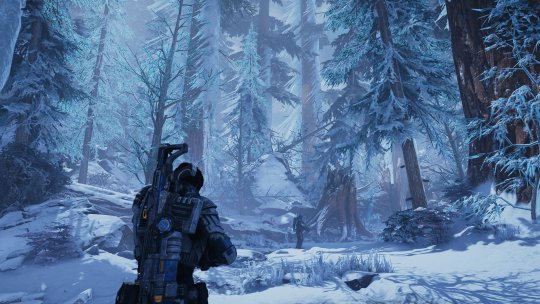
I’m a big fan of the way Gears V opens, both the J.D led first act that Microsoft did a really great job of hiding, and the Kait led second act that goes back into the truly messed up world of New Hope Research facility, with extremely interesting results! I wanted to talk a little bit about the New Hope chapter, and how it compares to the one seen in Gears of War 2!
Gears of War 2, back in 2008, both was and is, not a bad looking video game. Sure it’s aged pretty heavily by modern standards, but as far as games from 2008 go, you can find plenty that look a lot worse in 2020 than Gears Of War 2. The New Hope Research Facility chapter was, I would say, a highlight of that game to begin with, and it’s strong visual design played a big part of that. New Hope felt haunted. Both by the things that happened there, and the monsters still lurking the halls by the time Delta Squad arrive on the vague orders they’re given (shortly after emerging from the stomach of a giant worm, of course, because Gears Of War 2 was...a tale and a half). The dank hallways were still mostly intact, and the beasts contained within still hadn’t broken free. Of course, both those things would change on Delta’s visit, but it stills feels like as soon as you arrive, you leave. In the end, New Hope in Gears 2 is a short chapter, but impactful in 2008, and even more impactful now.
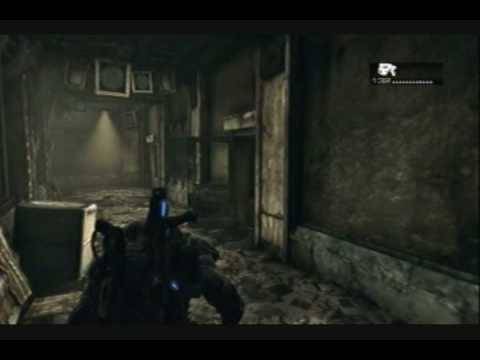
This rough screenshot isn’t doing it any favors, but you can sort of see what I mean with the way the general vibe of the facility goes in Gears of War 2.
Forty or so years later, when Kait and Del make their way to New Hope to learn more about Kait’s connection to the Locust, the horror show is somehow in even worse shape than you remember. Granted, advances in graphics technology go a long way in selling this. Hell, even the area around New Hope is now a thick old growth redwood forest, as opposed to the sort of barren nothing it was rendered as being in the middle of in Gears 2. I think this actually sells the idea of the facility a lot better, it’s even established that it was covered up while still functioning by the COG claiming it was a simple shipping depot, but who puts a shipping depot that deep in the woods?
It also has the little problem of Sera’s new extreme weather issues tearing that specific ruin to shreds. You thought the razorhail that pelted Delta in 2008 was bad? There’s full on pillars of ice crashing down into New Hope in 2020. Once you get inside you get the same basic vibes that it had in 2008, but brilliantly realized with the new tech at hand. Most notably, it’s dark (and I mean that literally) in a way the 2008 rendition wasn’t, with the samey level of light Unreal Engine produce back then doing the environmental storytelling no favors. It also focuses a bit more on the tragedy leading to the Sires, rather than on the Sires themselves as just another weird monster to shoot. In Gears 2, you more or less just walked down a series of hallways, then found yourself smack dab in the middle of Sire central. Here, they never actually attack you (not the case at the other secret lab in act 2, but still), and there’s far more sympathy generated for their plight via collectibles and notes that are scattered around in obvious places so the player will assuredly read them. It’s an interesting shift, making it clear that the Sires are the victims here, and even though they were obviously the aggressors in Gears 2, you maybe should have at least felt a little bad about their situation while Marcus was screaming “NOTHING BUT BITS” as he chainsawed them in half.
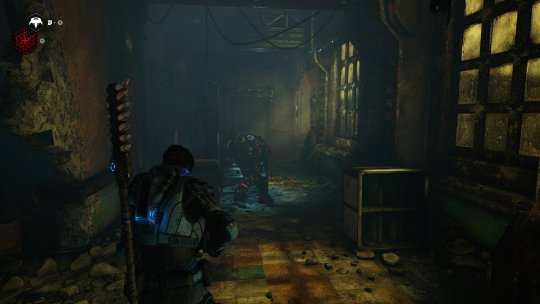
Here you can really see what the new lighting model does for the dank, dirty feeling of the few hallways that have survived in New Hope at all intact.
I love it when games do this, return to old concepts with fresh perspectives. Sometimes it runs the risk of being repetitive, but here it just adds on new layers to an old horror in wonderfully engaging ways.
Random Screenshot Of The Day: (Spoilers For Gears Tactics)
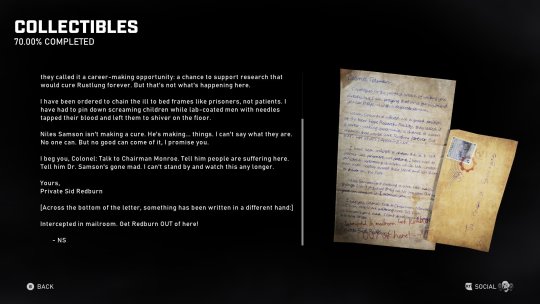
Cleverly, one of the aforementioned collectibles I mentioned is a letter from Sid Redburn, co-star of Gears Tactics, begging the COG Chariman to shut down the inhumane conditions he’s been privy too. His first hand knowledge of New Hope and the true origins of The Locust play a big part of his arc through Gears Tactics, so finding this collectible again was a really fun surprise!
Stray Notes:
- Whew! That went more in depth than I intended it too! I don’t know if I’ve noted this about myself before, holy hell do I love Gears of War.
- I watched Scoob! tonight with it’s straight to home digital release and it was....alright. I see a lot of extreme anger over it but I wouldn’t go that far, it’s just too generic of a movie to really inspire all that much enthusiasm, and that’s coming from a huge Scooby-Doo fanboy! You’d really be better off just watching your favorite DTV entry again and waiting for the rental price of this one to hit that traditional $6 range.
- My Miku game download failed and now I have to start from the beginning, someone please tell Nintendo how the internet works i’m genuinely begging you.
- Throwing my name up there in the title! May as well brand these things a little more than I already do right?
#gears of war#gears of war 2#gears of war 3#gears v#gears of war 4#gears 2#gears of war lore#video game review#xbox 360 games#xbox one games#xbox one#Xbox Games#xbox#the coalition#xbox game studios#microsoft#new hope#new hope research facility#marcus fenix#kait diaz#video games#video game#old games#2019 games#2019#2008#breads game journal#bread's game journal#game journal#game journaling
2 notes
·
View notes
Text
Men’s Lives Have Meaning, Part 5: The Hour of Ghosts
Series so far here
“There’s a tipping point in every tragedy where inevitability locks the exit doors on free will and you know that after this, there is no turning back.”
-- @racefortheironthrone
Hello everyone. My name is Emmett, and I could have been imagined, designed, constructed, and sold as a consumer for the Lord of the Rings movie trilogy. I had just turned twelve when the first one came out at the end of 2001, I’d read the books that summer, and the infusion of swelling Hollywood orchestras and Peter Jackson’s beloved action schlock was perfectly calibrated to take my love for the material and shoot it into the stratosphere. I still look back on those movies with love...mostly. There are moments, especially in Return of the King, where the tone tips overboard:
youtube
On one level, that’s what we want our heroes to say, right? We’re up against the odds, we might not be rewarded for our efforts, but let’s do it anyway; that’s the lesson a lot of great genre fiction is meant to leave us with, in one form or another. The problem with that clip is the knowing wink, the sly acknowledgement that after they’ve escaped so many other hair-raising disasters, this is just another day at work. I get the joke, but it would make more sense for (say) a Bond or Indy movie, where it really is just another day at work and part of the enjoyment comes from how what’s over-the-top for us is normal for them. In the context of LOTR, it’s tonally off, because this is not supposed to feel episodic. It’s supposed to feel climactic, like our heroes are genuinely in danger as everything comes to a head, and that’s marred when you expose the plot armor so blatantly. If this is just another day, why are we supposed to be invested in their risk?
Of course, Peter Jackson didn’t invent that problem. It’s a storytelling problem. And that is why GRRM created Quentyn Martell. It’s why he tries to tame a dragon and why he fails: to reclaim the stakes and re-sensitize us to the risk. It’s not just that he dies, it’s how and why he dies. What does it mean to not have plot armor? What does it say about quest narratives that they can collapse so completely and yet the quester clings to tropes as if they’ll save him? How are we to live if Story fails as an organizing principle? “The Spurned Suitor” brings these questions to the forefront, right before “The Dragontamer” sets it all on fire. It’s the most reflective and dialogue-heavy of Quent’s chapters, the most thematically explicit; it’s the one that cuts through the hellish imagery dominating this storyline right to what it all means. In genre terms, where previous Quent chapters soaked the fantasy tropes in blood-red horror, this chapter has a distinctly noirish feel to it, in terms of both imagery and theme.
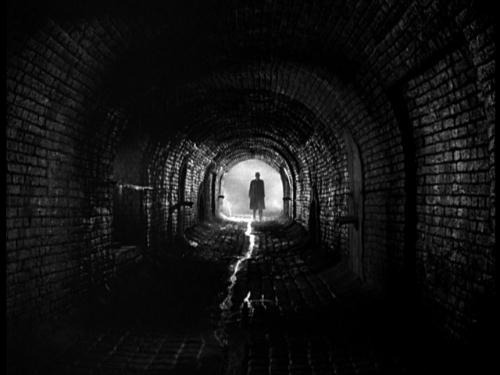
“The Merchant’s Man” introduced Quent reeling from his friends’ deaths; “The Windblown” caught up with him in the wake of the Sack of Astapor. In both chapters, as I said in the essays in question, GRRM’s focus is less the traumatic event itself than the psychological impact on Quent--both are about how one processes these existential challenges to the hero’s journey, and why one would keep going in the face of them. “The Spurned Suitor” pulls the same trick, but with a twist. In this case, the pre-chapter trauma that shapes the chapter isn’t an obstacle to the quest. It’s the outright failure of it. Quent reached the beautiful princess, proved himself willing (though not exactly eager) to transform from a frog back into a prince...but she said no.
To be clear, chapter title aside, the horror here is not getting rejected by a pretty girl. (Like I said last time, Dany doesn’t reject Quent in favor of the dark dashing Daario and his lust for open war, but in favor of the dishwater-dull Hizdahr and the peace he ostensibly brings; as she tells herself upon agreeing to marry the latter, she’s trying to act on behalf of her people.) The horror here is getting rejected after losing your friends and killing screaming teenagers along the way; the horror is selling your soul to live a life you didn’t want to live, only to find you’re not even going to get that. The horror is that it wasn’t worth it. It all meant nothing. Story is a lie. Of course, if that’s all there was to Quent’s story, it would be tired and boring. What grounds it emotionally is that laserlike focus on the aftermath of that revelation, as it hits home harder with each step of the descent. What do you do when your easy narrative falls apart and you’re left with no good options?
In “The Merchant’s Man” and “The Windblown,” Quent’s reaction to this trauma and disillusionment was to repress what he’d gone through and done, soldiering on with the Windblown repeatedly intervening (as if sent by some sinister observing God-Author) to allow him to do so. Now that he’s faced with the failure of his quest, all the kid wants to do is to go home, but he can’t bring himself to face the shame of failure and (even more so) his survivor’s guilt...
“We should be heeding Selmy. When Barristan the Bold tells you to run, a wise man laces up his boots. We should find a ship for Volantis whilst the port is still open.”
Just the mention turned Ser Archibald’s cheeks green. “No more ships. I’d sooner hop back to Volantis on one foot.”
Volantis, Quentyn thought. Then Lys, then home. Back the way I came, empty-handed. Three brave men dead, for what?
It would be sweet to see the Greenblood again, to visit Sunspear and the Water Gardens and breathe the clean sweet mountain air of Yronwood in place of the hot, wet, filthy humors of Slaver’s Bay. His father would speak no word of rebuke, Quentyn knew, but the disappointment would be there in his eyes. His sister would be scornful, the Sand Snakes would mock him with smiles sharp as swords, and Lord Yronwood, his second father, who had sent his own son along to keep him safe…
“I will not keep you here,” Quentyn told his friends. “My father laid this task on me, not you. Go home, if that is what you want. By whatever means you like. I am staying.”
...and so instead, he reaches out to the Windblown in the hopes that they’ll once again keep his quest going, even as their actions and attitudes continue to undercut the ostensibly righteous and hopeful nature of said quest. We see that right from the beginning of Quent’s penultimate POV chapter:
The hour of ghosts was almost upon them when Ser Gerris Drinkwater returned to the pyramid to report that he had found Beans, Books, and Old Bill Bone in one of Meereen’s less savory cellars, drinking yellow wine and watching naked slaves kill one another with bare hands and filed teeth.
This fighting pit, an unofficial but not-so-secret alternative to Daznak’s, is a glimpse of the Meereen outside the rarified domain of the Masters. The black market sprang up as the sanctioned one shut down, and that the Windblown are taking part reminds us of the sellswords’ own analogous role in The System, straddling the line between a standard part of Essosi military coalitions and a wild card constantly in the position to upset the applecart.
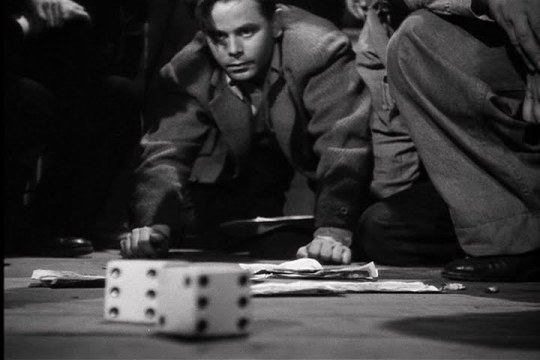
That backdrop provides the thematic and emotional context for the decision Quent makes in this chapter. The hour of ghosts, indeed; the shadow city of alleys and cellars into which Team Quentyn descends in “The Spurned Suitor” is haunted, not only by those already dead but also by the deaths to come. As has been the case throughout Quent’s storyline, his personal struggles dovetail with (and are influenced by) the big picture of the Meereenese Knot. Just as Dany’s refusal obliterated the remnants of the “tale to tell our grandchildren” veneer, leading to Quent betting his life on a wild roll of the dice, so has her departure at Daznak’s shattered the pretense of peace, leading to the whole pot boiling over as ADWD comes to a close. Indeed, I’d argue that Quent’s quest and Hizdahr’s peace are analogous. They sound good on the surface, appealing to values we instinctively support, but quickly prove rotten underneath the gild, enabling the worst actors in the Meereenese Knot instead of righteous causes, before they both finally come crashing down at the same place and time in the Kingbreaker/Dragontamer two-sided setpiece. It’s all approaching the tipping point, personally and politically.
But as I said, what makes Quent’s chapters more than glum grim deconstruction is the extent to which the characters are aware of this tipping point, that the story is falling apart around them, and that’s made explicit in “The Spurned Suitor.” On their way to their fateful meeting with the Tattered Prince, Quent and Drink argue about the former’s plans, and IMO it’s one of the most important and profound passages in the series. Let’s break it down.
“ ‘The dragon has three heads,’ she said to me. ‘My marriage need not be the end of all your hopes,’ she said. ‘I know why you are here. For fire and blood.’ I have Targaryen blood in me, you know that. I can trace my lineage back —”
“Fuck your lineage,” said Gerris. “The dragons won’t care about your blood, except maybe how it tastes. You cannot tame a dragon with a history lesson. They’re monsters, not maesters. Quent, is this truly what you want to do?”
“This is what I have to do. For Dorne. For my father. For Cletus and Will and Maester Kedry.”
“They’re dead,” said Gerris. “They won’t care.”
“All dead,” Quentyn agreed. “For what? To bring me here, so I might wed the dragon queen. A grand adventure, Cletus called it. Demon roads and stormy seas, and at the end of it the most beautiful woman in the world. A tale to tell our grandchildren. But Cletus will never father a child, unless he left a bastard in the belly of that tavern wench he liked. Will will never have his wedding. Their deaths should have some meaning.”
Gerris pointed to where a corpse slumped against a brick wall, attended by a cloud of glistening green flies. “Did his death have meaning?”
Quentyn looked at the body with distaste. “He died of the flux. Stay well away from him.” The pale mare was inside the city walls. Small wonder that the streets seemed so empty. “The Unsullied will send a corpse cart for him.”
“No doubt. But that was not my question. Men’s lives have meaning, not their deaths. I loved Will and Cletus too, but this will not bring them back to us. This is a mistake, Quent. You cannot trust in sellswords.”
“They are men like any other men. They want gold, glory, power. That’s all I am trusting in.” That, and my own destiny. I am a prince of Dorne, and the blood of dragons is in my veins.
We see here that Quent’s sunk cost fallacy has completely taken over his decision-making process. Because his quest has already gotten people killed, it must continue, or in his mind, they died for nothing. This is, of course, extremely relatable. We’ve all made decisions like this, albeit usually on a much smaller scale. No one likes to admit failure, everyone wants to attach some meaning to their losses, and we’re meant to understand why Quent is so helplessly mired in panicked desperation. I can fix this, I will fix this, oh gods please I have to fix this...
GRRM makes this decision easy to empathize with in order to sucker punch us with the larger revelation: the basic mechanics of the genre are designed to create precisely such a sunk cost fallacy. You are supposed to lose companions--that raises the stakes, heightens our emotional involvement, and challenges the protagonist both externally (how do I logistically complete the quest without that companion?) and internally (how do I soldier on in the face of that loss?) You are supposed to have a low point where you question everything that’s led you to this moment. You are supposed to take an enormous risk. You are supposed to, literally or metaphorically, tame a dragon.
In Quent’s case, however, we’re dealing with a Last Hero who never finds the Children of the Forest--or perhaps, a Last Hero whom the Children pitilessly watch die. As such, when looking at his arc as a whole, those losses and low points don’t serve to allow our hero to prove himself and us to revel in victory snatched from the jaws of defeat. Instead, they are warning signs that our hero ignores. Quentyn’s story interrogates reader assumptions about quest narratives: why do we embrace such a narrative? What are we overlooking when we do so? What if the quest in question rips those assumptions limb from limb and leaves them to bleed out on the deck of the Meadowlark, in the ashes of Astapor, in that hellish pit beneath the Great Pyramid?
As far as what all this looks like to Quent himself, it’s made clear that what he’s relying on to save his quest (and his soul) isn’t anything intrinsic to his actions. He’s not counting on courage or ingenuity. He’s not even counting, first and foremost, on the Windblown. He’s counting on the story itself to save him, the elements of his narrative that would seem to demand he succeed: his princely heritage, his lost companions, the fact that he’s taking a big foolish romantic risk.
But as I said a few essays back, the story is in fact out to kill Quentyn Martell, and so Drink does what good friends have to do sometimes: tell you that you’re spouting BS. “Fuck your lineage” is GRRM speaking through Drink, launching a deconstructive nuke at the idea that your bloodline is what makes you The Hero. That holds true with the *actual* heroes as well, of course--one of the major themes of Jon’s story is that everything he’s learned and struggled with is what makes him a worthy savior figure, not R+L=J in and of itself. But it’s different with Quent because he doesn’t have a grand destiny, earned or otherwise. As such, he’s left alone in an existentialist void, trying to create meaning out of what’s befallen his quest.

And just as I wrote my series on Davos’s ADWD arc in order to talk about his letter to Marya, I wrote this series in order to talk about Drink’s response to Quent’s desperate plea to the gods that “their deaths should have some meaning.” This is a bold statement, I know, but: “Men’s lives have meaning, not their deaths” is the closest we’ve gotten to an overarching thesis statement for ASOIAF. It reaches all the way back to the first book, to Ned (who, like Quent, turns out to not be the protagonist after all) and his shocking demise. So many readers have interpreted that moment, as well as the Red Wedding two books later, as being indicative of nihilism on GRRM’s part. Everything is chaos, honor gets you killed and is therefore worthless, “power is power.” But this is not so. Ned’s legacy is not his death, it is his life. The children determined to find each other again because Dad taught them to stick together and be brave, the vassals who have set out to rescue and restore those children in his name, the memory both in-universe and IRL of a decent man who treated his servants like human beings worth listening to and who was determined to protect the young and innocent...all of this is the meaning of Ned Stark, not that he ended up as a head on a spike. By the same token, the meaning of Tywin Lannister isn’t that he died on the can. It’s why he died on the can, and that is because he lived a terrible life. His legacy is his family tearing itself apart, his hoped-for Lannister regime falling to pieces across Westeros, and his oh-so-symbolic reeking corpse. One of these men, for all his mistakes, found and spread a worthy meaning in his brief time on Terros, and the other, for all his triumphs, did not. We are all mortal; all of us, “from the highest lord to the lowest gutter rat,” are ultimately helpless before the abyss that Quent leaps into in his final chapter. No one (not even Euron, try as he might) can change that. What matters, what makes us who are, what means something, is how we live our lives knowing that in the end, the house always wins.
“Men’s lives have meaning, not their deaths” is also the first arrow in my quiver when it comes to defending the worth of the new characters and storylines in the Feastdance. Why should we care about the Martells or the “Griffs” if they’re just showing up now and will probably die before endgame? Because moving the plot along to book seven is not actually what makes a story meaningful. Lives lived make stories meaningful:
The door to the roof of the tower was stuck so fast that it was plain no one had opened it in years. He had to put his shoulder to it to force it open. But when Jon Connington stepped out onto the high battlements, the view was just as intoxicating as he remembered: the crag with its wind-carved rocks and jagged spires, the sea below growling and worrying at the foot of the castle like some restless beast, endless leagues of sky and cloud, the wood with its autumnal colors. “Your father’s lands are beautiful,” Prince Rhaegar had said, standing right where Jon was standing now. And the boy he’d been had replied, “One day they will all be mine.” As if that could impress a prince who was heir to the entire realm, from the Arbor to the Wall.
Griffin’s Roost had been his, eventually, if only for a few short years. From here, Jon Connington had ruled broad lands extending many leagues to the west, north, and south, just as his father and his father’s father had before him. But his father and his father’s father had never lost their lands. He had. I rose too high, loved too hard, dared too much. I tried to grasp a star, overreached, and fell.
And of course, Drink’s powerful words are GRRM’s message to us about how to think about Quent. Do not think that he meant nothing because he failed and died or because he was never going to be the protagonist, the author is saying. What matters is his life, the POV we have experienced and come to understand. He lived, he tried, he died. It is for us to remember him. I only wish he had heeded the lesson Drink was trying to teach him, before it was far too late.
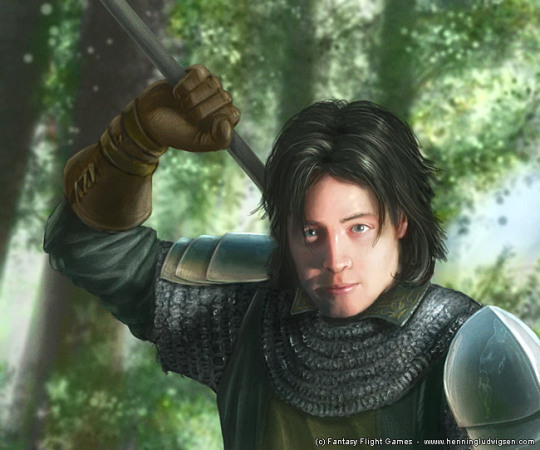
Only with that why firmly established does GRRM move onto the what, knowing that the former will lend resonance to the latter. The plot of “The Spurned Suitor” concerns Quent turning in desperation to the Tattered Prince and his Windblown for help taming one of Dany’s captive children, despite having betrayed them. As the city simmers and seethes around them, the princes meet in secret.
The sun had sunk below the city wall by the time they found the purple lotus, painted on the weathered wooden door of a low brick hovel squatting amidst a row of similar hovels in the shadow of the great yellow-and-green pyramid of Rhazdar. Quentyn knocked twice, as instructed. A gruff voice answered through the door, growling something unintelligible in the mongrel tongue of Slaver’s Bay, an ugly blend of Old Ghiscari and High Valyrian. The prince answered in the same tongue. “Freedom.”
The door opened. Gerris entered first, for caution’s sake, with Quentyn close behind him and the big man bringing up the rear. Within, the air was hazy with bluish smoke, whose sweet smell could not quite cover up the deeper stinks of piss and sour wine and rotting meat. The space was much larger than it had seemed from without, stretching off to right and left into the adjoining hovels. What had appeared to be a dozen structures from the street turned into one long hall inside.
At this hour the house was less than half full. A few of the patrons favored the Dornishmen with looks bored or hostile or curious. The rest were crowded around the pit at the far end of the room, where a pair of naked men were slashing at each other with knives whilst the watchers cheered them on.
Quentyn saw no sign of the men they had come to meet. Then a door he had not seen before swung open, and an old woman emerged, a shriveled thing in a dark red tokar fringed with tiny golden skulls. Her skin was white as mare’s milk, her hair so thin that he could see the scalp beneath.
“Dorne,” she said, “I be Zahrina. Purple Lotus. Go down here, you find them.” She held the door and gestured them through.
Team Quent is going underground and behind the curtain in “The Spurned Suitor.” In terms of the big picture, we’re seeing a Meereen that Dany never even glimpsed from atop the pyramid. On a more intimate scale, this imagery reflects the scales falling from Quent’s eyes about how the world works. He never thought his quest would involve cutting ethically murky deals in back-alley parlors (again, it’s suddenly a noir story), but if he wants to keep going for his fallen friends’ sake, it’s the only avenue he has left. It’s worth noting here how Quent contrasts with his fellow Questers for Dany. Where Quent wonders why Dany would ever choose him “among all the princes of the world,” Aegon has never even considered that she would reject him, because he was raised in a Perfect Prince bubble while Quent was told out of nowhere to Go West East, Young Man at age 18. Tyrion, too, wanders the shifting political sands of Essos in the wake of Dany’s crusade, but at this point in his storyline, he finds it hard to care about most of it, so his bitter detached cynicism makes for another illuminating contrast with Quent’s grief and desperation. And Victarion...well, as I’ve argued before, his story is the black comedy to Quent’s tragedy. Vic’s doom is presented as a huge joke on him by his puppetmasters: Euron, Moqorro, and George R.R. Martin. There’s no tragedy there because Vic keeps rejecting the possibility for growth or change. He’s there to be laughed at, by us as well as the monkeys. But with Quent, there really was a worthy life he could’ve lived (as I’ll get into next time). It’s just not this one, this one-way ride into fiery oblivion, escorted and enabled by the Satan of Slaver’s Bay and his motley crew. Speaking of which:
An undercellar. It was a long way down, and so dark that Quentyn had to feel his way to keep from slipping. Near the bottom Ser Archibald pulled his dagger.
They emerged in a brick vault thrice the size of the winesink above. Huge wooden vats lined the walls as far as the prince could see. A red lantern hung on a hook just inside the door, and a greasy black candle flickered on an overturned barrel serving as a table. That was the only light.
Caggo Corpsekiller was pacing by the wine vats, his black arakh hanging at his hip. Pretty Meris stood cradling a crossbow, her eyes as cold and dead as two grey stones. Denzo D’han barred the door once the Dornishmen were inside, then took up a position in front of it, arms crossed against his chest.
One too many, Quentyn thought.
The Tattered Prince himself was seated at the table, nursing a cup of wine. In the yellow candlelight his silver-grey hair seemed almost golden, though the pouches underneath his eyes were etched as large as saddlebags. He wore a brown wool traveler’s cloak, with silvery chain mail glimmering underneath. Did that betoken treachery or simple prudence? An old sellsword is a cautious sellsword. Quentyn approached his table. “My lord. You look different without your cloak.”
“My ragged raiment?” The Pentoshi gave a shrug. “A poor thing…yet those tatters fill my foes with fear, and on the battlefield the sight of my rags blowing in the wind emboldens my men more than any banner. And if I want to move unseen, I need only slip it off to become plain and unremarkable.” He gestured at the bench across from him. “Sit. I understand you are a prince. Would that I had known. Will you drink? Zahrina offers food as well. Her bread is stale and her stew is unspeakable. Grease and salt, with a morsel or two of meat. Dog, she says, but I think rat is more likely. It will not kill you, though. I have found that it is only when the food is tempting that one must beware. Poisoners invariably choose the choicest dishes.”
“You brought three men,” Ser Gerris pointed out, with an edge in his voice. “We agreed on two apiece.”
“Meris is no man. Meris, sweet, undo your shirt, show him.”
“That will not be necessary,” said Quentyn. If the talk he had heard was true, beneath that shirt Pretty Meris had only the scars left by the men who’d cut her breasts off. “Meris is a woman, I agree. You’ve still twisted the terms.”
“Tattered and twisty, what a rogue I am. Three to two is not much of an advantage, it must be admitted, but it counts for something. In this world, a man must learn to seize whatever gifts the gods chose to send him. That was a lesson I learned at some cost. I offer it to you as a sign of my good faith.”

We’ve got a literal descent matching the emotional/thematic one, to make a foolish risky deal that will end up claiming our protagonist body and soul, with someone who’s lying and spinning right off the bat, his deceptively simple appearance hiding a cruel sardonic heart...so yeah, like I said, the Tattered Prince is the devil of the Meereenese Knot, the tempter-corrupter figure luring Quent into hell. “Tattered and twisty, what a rogue I am” is precisely the sort of way Satan and characters similar to him talk; they lie to you, and then they make fun of you for believing them. After all, Quent, you only got into Meereen in the first place because of the Tattered Prince’s deceitfulness...and because of your own.
The Pentoshi gave a shrug. “One thing I am certain of. Someone will have need of our swords.”
“I have need of those swords. Dorne will hire you.”
The Tattered Prince glanced at Pretty Meris. “He does not lack for gall, this Frog. Must I remind him? My dear prince, the last contract we signed you used to wipe your pretty pink bottom.”
“I will double whatever the Yunkishmen are paying you.”
“And pay in gold upon the signing of our contract, yes?”
“I will pay you part when we reach Volantis, the rest when I am back in Sunspear. We brought gold with us when we set sail, but it would have been hard to conceal once we joined the company, so we gave it over to the banks. I can show you papers.”
“Ah. Papers. But we will be paid double.”
“Twice as many papers,” said Pretty Meris.
“The rest you’ll have in Dorne,” Quentyn insisted. “My father is a man of honor. If I put my seal to an agreement, he will fulfill its terms. You have my word on that.”
The Tattered Prince finished his wine, turned the cup over, and set it down between them. “So. Let me see if I understand. A proven liar and oathbreaker wishes to contract with us and pay in promises. And for what services? I wonder. Are my Windblown to smash the Yunkai’i and sack the Yellow City? Defeat a Dothraki khalasar in the field? Escort you home to your father? Or will you be content if we deliver Queen Daenerys to your bed wet and willing? Tell me true, Prince Frog. What would you have of me and mine?”
You’ve been lying this whole way, to the world and yourself. What’s one more piece of wood on that fire? Again, though, it’s precisely that sunk-cost fallacy, the panicked certainty that it’s too late to turn back, that gets Quent killed. In so much of genre fiction, that “I started this, I have to finish it” drive is celebrated, even cast as the thing that makes you the hero. Here, it is revealed as a sad self-delusion that only serves to throw another body on the pile of the dead. Quent needs so badly to make his friends’ sacrifice worth it that he’s willing to sell out an *entire city* (namely, Pentos) to make it happen. The cynical world-weary Windblown are here to cut through that fragile narrative, telling Quent that neither he nor his story is special:
“I ask your pardon for our deception. The only ships sailing for Slaver’s Bay were those that had been hired to bring you to the wars.”
The Tattered Prince gave a shrug. “Every turncloak has his tale. You are not the first to swear me your swords, take my coin, and run. All of them have reasons. ‘My little son is sick,’ or ‘My wife is putting horns on me,’ or ‘The other men all make me suck their cocks.’ Such a charming boy, the last, but I did not excuse his desertion. Another fellow told me our food was so wretched that he had to flee before it made him sick, so I had his foot cut off, roasted it up, and fed it to him. Then I made him our camp cook. Our meals improved markedly, and when his contract was fulfilled he signed another. You, though…several of my best are locked up in the queen’s dungeons thanks to that lying tongue of yours, and I doubt that you can even cook.”
“I am a prince of Dorne,” said Quentyn. “I had a duty to my father and my people. There was a secret marriage pact.”
“So I heard. And when the silver queen saw your scrap of parchment she fell into your arms, yes?”
“No,” said Pretty Meris.
“No? Oh, I recall. Your bride flew off on a dragon. Well, when she returns, do be sure to invite us to your nuptials. The men of the company would love to drink to your happiness, and I do love a Westerosi wedding. The bedding part especially, only…oh, wait…” He turned to Denzo D’han. “Denzo, I thought you told me that the dragon queen had married some Ghiscari.”
“A Meereenese nobleman. Rich.”
The Tattered Prince turned back to Quentyn. “Could that be true? Surely not. What of your marriage pact?”
“She laughed at him,” said Pretty Meris.
Daenerys never laughed. The rest of Meereen might see him as an amusing curiosity, like the exiled Summer Islander King Robert used to keep at King’s Landing, but the queen had always spoken to him gently. “We came too late,” said Quentyn.
Interesting to note that Quent is pulling an UnKiss here, convincing himself that Dany did not laugh upon him revealing his identity and mission, when in truth, she did. That just goes to show how thoroughly he’s backed himself into a corner. “We came too late,” and so again, we have a Quent chapter ending with the Windblown enabling our hero’s descent. Of course, Quent is responsible for this decision--he came to them, not the other way around. I’m not trying to strip him of agency, as that would be a much less engaging story. But what I’m interested in here is how the failure of the quest, the shattering of the ideal, has led to Quent making this terrible decision. Here’s where GRRM’s existentialist-romantic take on the genre comes into play: Quent was taught to uphold and believe in certain norms because an ordered universe will reward him for it, not because following the rules is the right thing to do in itself. As such, when Quent’s quest proves over and over again that there is no inherent order to the universe, and as such no automatic reward, Quent loses all moorings; he doesn’t have that Davos/Brienne “no chance and no choice” ethos to keep him going in the face of the abyss.
And that’s why he makes a deal with the devil: it seems like his best option.
“I need you to help me steal a dragon.”
Caggo Corpsekiller chuckled. Pretty Meris curled her lip in a half-smile. Denzo D’han whistled.
The Tattered Prince only leaned back on his stool and said, “Double does not pay for dragons, princeling. Even a frog should know that much. Dragons come dear. And men who pay in promises should have at least the sense to promise more.”
“If you want me to triple—”
“What I want,” said the Tattered Prince, “is Pentos.”
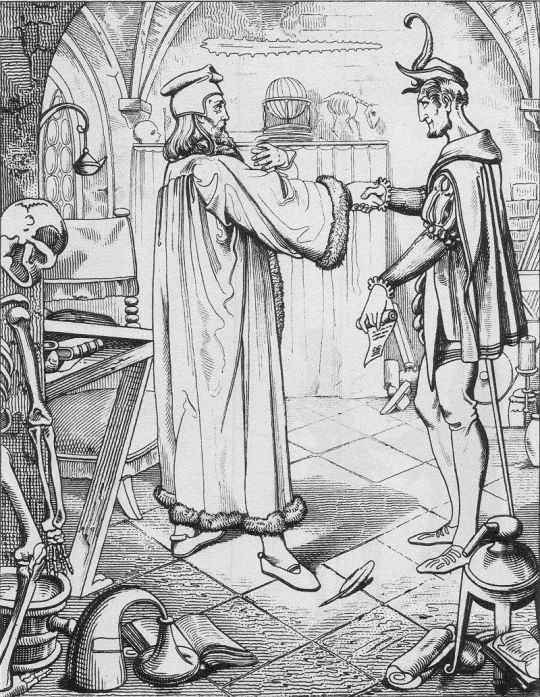
And as always, making a deal with the devil lands our protagonist in fiery torment, condemned by his own folly. After Quent’s death, Barristan takes responsibility for delivering Pentos to Tatters, and come TWOW, I think Dany will fulfill the bargain after confronting Illyrio RE Aegon. Because a deal with the devil can’t be undone--it just transfers from person to person.
Indeed, it’s tonally appropriate that Quent’s quest climaxes not with him becoming the hero, but with him letting the devil back into paradise. One thing I noticed in this reread is how closely the form of “The Spurned Suitor” matches that of “The Dragontamer.” In both chapters, Quent trembles on the edge of the Void, wondering am I really going to go through with this, decides that he is, and this descent is promptly made literal. In his third chapter, he descends to the cellar to face the Tattered Prince and his cronies, sealing the doom that unfolds in his fourth chapter, in which he descends into the dank dark hell beneath the Great Pyramid to face Rhaegal and Viserion. One inextricably leads to the other; symbolically, the Tattered Prince is the dragonfire, the epitome of how Quent trying to “fix” his own story only serves to keep revealing how it cannot be fixed. This is your life, Quentyn Martell. You are not the hero. And just as with my second favorite character in ASOIAF, Stannis Baratheon, this revelation will be rendered in fire and blood.
#quentyn martell#quentyn in adwd#gerris drinkwater#the tattered prince#asoiaf meta#the windblown#meereen#a dance with dragons
202 notes
·
View notes
Text
Mob Psycho 100 Season 2
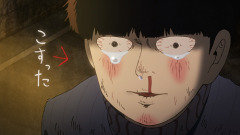
Hello and welcome to the first outright perfect episode of anime of 2019! Mob Psycho 100 knocked it out of the park this week in every respect, so let’s just jump right in!
Right off the bat, Bones is out in full force animation wise. Everything about this episode, visually, was fantastic. Even in drab, rain-slick scenes they found a way to introduce color to a drab landscape. And that isn’t even mentioning the wholly unique perspectives or styles for animation. Take for instance the straight up street fighter/fighting game reference. Done entirely in Mob Psycho’s style, it was a fantastic gag. Then there was one of my favorite styles, which only appears in Mob Psycho, the paint on glass effects. For depicting other worldly spirits, I think it does a fantastic job of showing that etherealness. Add on to all of this the sheer amount of sakuga throughout the episode, from Dimple jumping between trees, to the flowing sludge of the monster spirit, and you have a feast for the eyes. 2 weeks in and Bones has already won Animation. Wow.
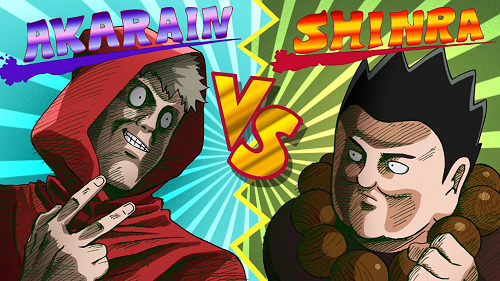
Now, onto the actual story content of the episode. Normally we would be entering the Urban Legend arc for the series, however parts of this were already covered in the first season. For instance, the exorcism at the girls highschool and the Scarecrow from the first episode were originally part of this arc. I think the way Mob Psycho handled those was still good, the Scarecrow was a good introduction and it didn’t hurt the series at all. It just means this arc won’t be as long as you might think, probably ending next episode. That isn’t to say it won’t be worthwhile though, if this episode was anything to go by. In a single episode Mob Psycho established a new psychic, set him up as a fraud only to reveal him as an upstanding citizen combatting spirits. Walking through his character in a single 22 minute episode. Lovely.
His whole “side story”, though really Mob and Reigan are the side story here, was great. I loved how it started with nothing paranormal at all, but hinting it might be. Then revealing it to be just a streaker that could be caught without powers. Until it all culminates in a big supernatural fight with a legitimate urban legend. Each of these with some sort of commentary on society, as the Dragger is fueled by peoples belief and cannot be fought by those who fear it. ONE (the author for Mob Psycho and One Punch Man) really is a great writer. He hits on these topics close to society or personal experiences, but wraps them in a supernatural shell. Removing it just enough from reality that it doesn’t become a direct critique of modern society, but still planting those ideas in the viewers heads.

Take the streaker for example. What started as a simple ass gag in a raincoat quickly turned into a dark dive into a criminals mind. Describing the mentality of the criminals high. How he gets off not only on revealing himself, but on everyone knowing he exists. A sort of perverse celebrity status. We see this in real life all the time with mass murderers, bombers and such. Who want to be known, want their message to get spread by the news media. It was all very dark, yet because of the previous setup with the childrens park, it worked well. Yeah, it might have jumped from jokey to serious a bit quickly. But I think Mob Psycho’s humor, which permeates everything about it, softened the blow a bit.
Meanwhile Mob and Reigan are off on their “side” adventure. What I love about this is that it reinforces Reigans character. We constantly see he is a con-artist, praying on people’s idiocy or troubles. Yet we also see he does legitimately care. Giving them peace of mind, or going out of his way to clean up an old man’s dog. To Reigan no job is to dirty or undesirable to do, so long as he gets paid and someone is happy. In fact we learn from Shinra that Reigan is charging far below the standard psychic price. Most likely it’s unintentional, if he thought he could get more he would go for it. But it reinforces that Reigan is not a prideful man, just one trying to get by on the only skill he really has. His maxed out charisma stat.

As far as the Dragger scenes go, I loved them.The whole sequence was animated fantastically, showing that no one can match Bones when they are their best. So many interesting angles, rotating shots and unbroken cuts. From the closeups of her face to the flowing sludge of the second half, Bones was here in full force. I also enjoyed the subtler aspects of the scene. Such as the water slowly rising up their feet, as the trees sunk behind them. The use of mud splashing against trees and landing in the shape of a screaming face. The tiny dolls themselves and their use in the fight. Simply put, Mob Psychois probably the best animated of the season and I fully expect it to compete for best of the year.
There was also the narrative aspect of the fight that was interesting. Last week Mob decided to start caring more about his emotions and such. This week tackles his social ineptitude and how breaking yourself off from fads isn’t necessarily a bad thing. It was Mob’s detachment, his individuality, that allowed him to face the dragger. He doesn’t care much what other people think, so the fads and pop culture never really took root in his mind. That of course has its downsides, it hurts his social prospects. But Mob Psycho also shows how it has its perks. Giving him the ability to think outside the box, not tied down by social conventions. To drive this home, right after this, Reigan talks to Mob about paying lip-service in the adult world. At least feigning knowledge of pop-culture, though he did it by yelling.
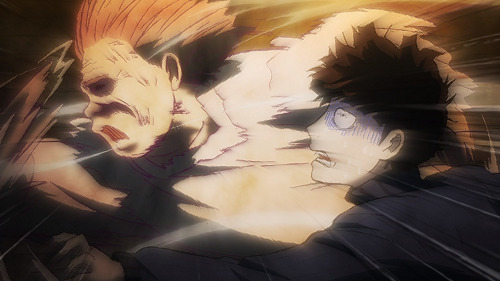
The slowly growing rift between Reigan and Mob aside, the last bit of the episode was the Dashing Granny. God this was a funny. This grandma gag was better animated than some full on series. All for a joke. In other series, I always reference the Simpsons and their layered jokes when discussing comedy. This is because I think the early Simpsons has some of the most clever comedic timing and writing on TV. Here, we see Mob Psycho displaying the same kind of layering. The joke starts with the running grandma. Then it becomes less of a joke and more a “serious threat” since it can’t be exorcised. Mob can’t run for shit, but the first punchline hits as she just ignores him and runs by in an over the top fashion. Only to throw in one more punchline with Mob’s Body Improvement Club. Layers. Like an onion. Fantastic.
All in all, Mob Psycho is now 2 for 2 on fantastic episodes. They have so much going for them, so many layers in every aspect. The animation is a step above everything else of the season. The narrative is deep and the jokes are snappy. Clearly a lot of love and care has been put into this series. It shows in every frame. If I had to pick something to nitpick about, it might be the sound design/VA’s, but that is really stretching it. Like, nitpick to the point of absurdity, stretching it. I like both and it’s only rarely that something sounds funny to me. So with that all said, I think it safe to safe, Mob Psycho is fantastic and you should watch it.
1 note
·
View note